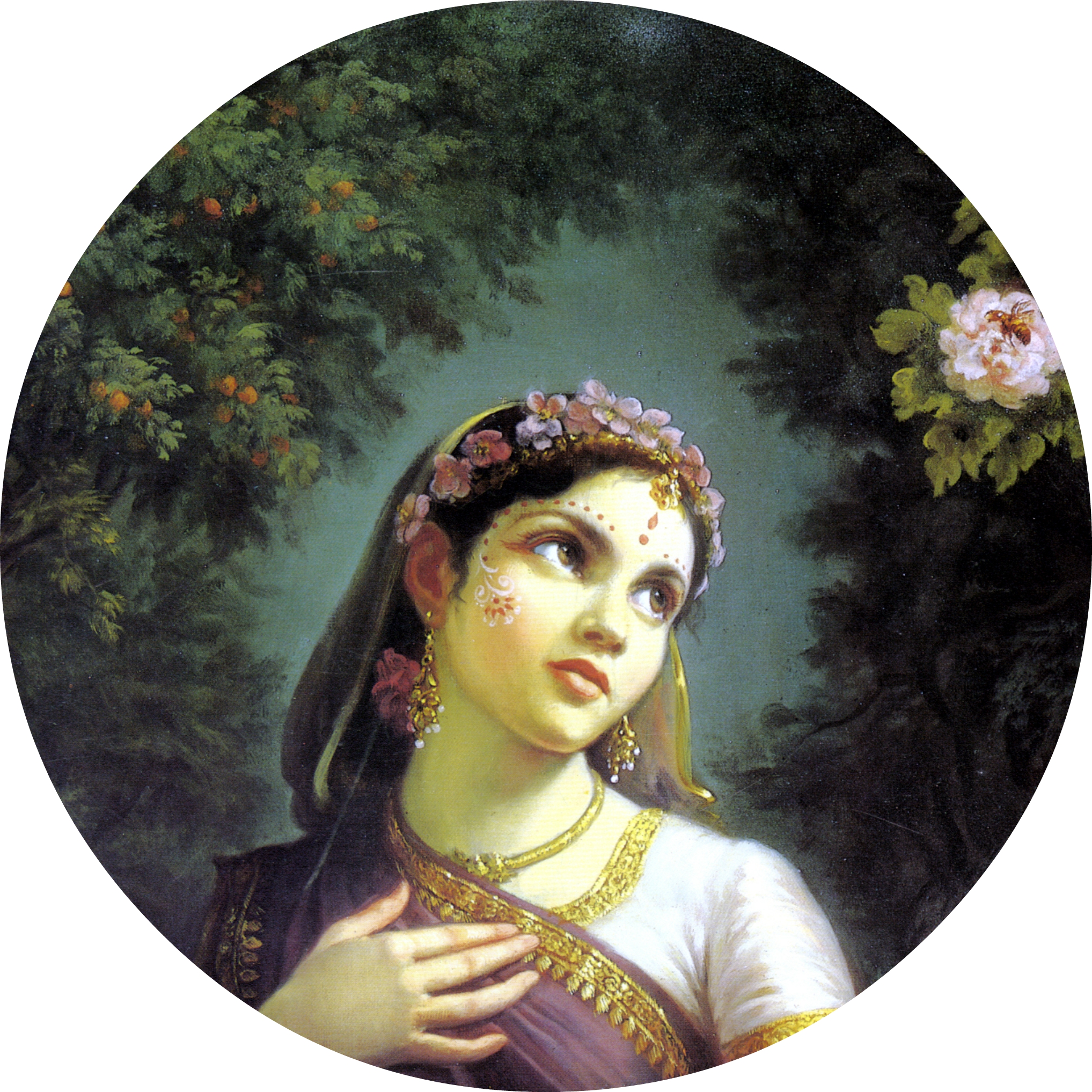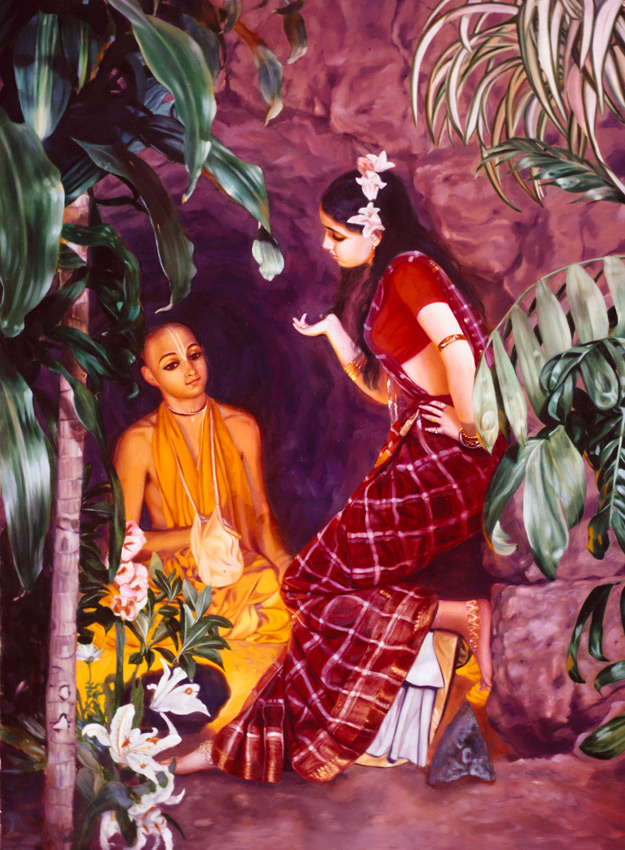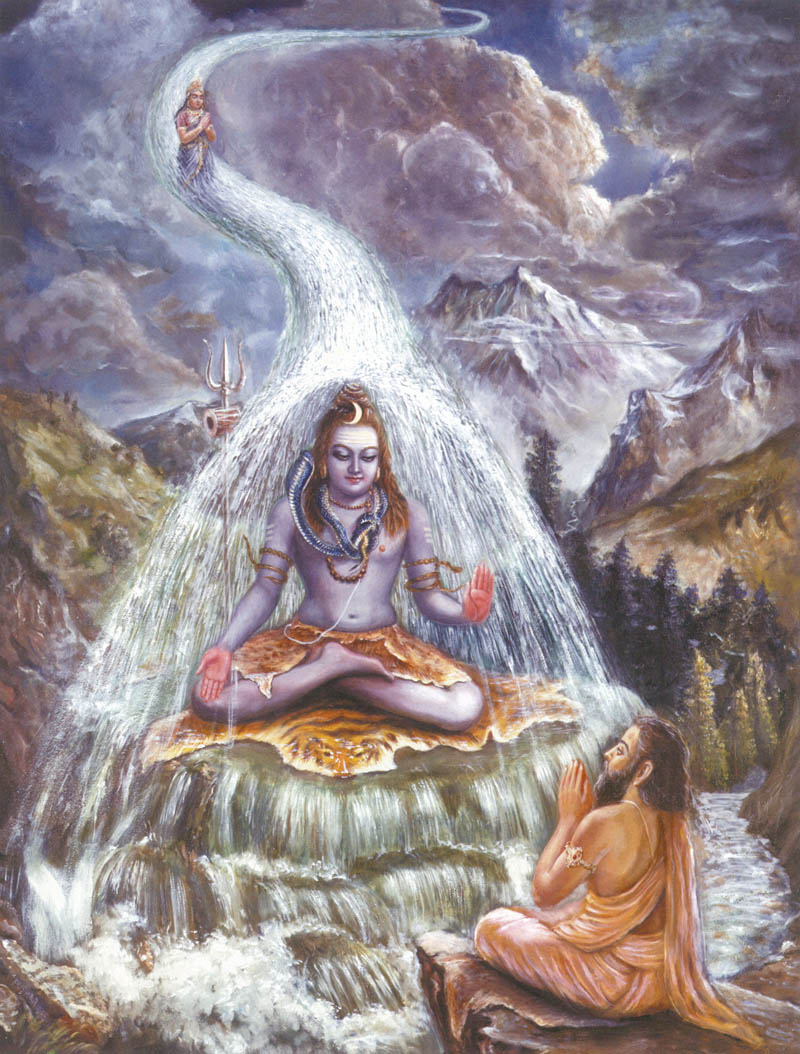(House of Bhakti) – Glorious Deaths
The following transcription contains an excerpt from a darśana with Śrīla Bhaktivedānta Nārāyaṇa Mahārāja in Los Angeles, California on June 8, 1998
Devotee: My mother recently died, in September. I was not able to place tulasī leaves in her mouth, but I did  hold a ceremony, and we read passages from the third and sixth cantos of Śrīmad-Bhāgavatam. I surrounded her dead body with tulasī leaves. I didn’t put the leaves in her mouth – just all around her. I didn’t see her get cremated.
hold a ceremony, and we read passages from the third and sixth cantos of Śrīmad-Bhāgavatam. I surrounded her dead body with tulasī leaves. I didn’t put the leaves in her mouth – just all around her. I didn’t see her get cremated.
I’m just wondering, is she going to be okay? She did come to me in a dream, and she said, “This is wonderful. Everybody looks like Kṛṣṇa. Thank you.” I’m just wondering, is there any chance for her spiritual advancement in the spiritual realm of Vaikuṇṭha? Is there any chance that she is in Kṛṣṇa-loka, or what?
Śrīla Bhaktivedānta Nārāyaṇa Mahārāja: I will tell a story about this: There was once a king who had thousands of sons. Those sons were killed – burnt to ashes – as a result of committing a great offense to a sage. Thousands of years later, there was a good son born in that dynasty. He served Kṛṣṇa, and he was therefore able to bring the Ganges from the Himālayas to the place where his ancestors had been burned to ashes. Although only a very small part of his ancestors’ bones remained and were touched by the Ganges, his ancestors were at once liberated and went to Vaikuṇṭha.*
Tulasī is not less powerful than the Ganges – she is more powerful. Whether your mother was alive or not, if tulasī’s leaves touched her body, she would be quickly liberated. She told you in your dream, “I am happy,” so it is alright. You have done so much for her.
Also, Śrīmad-Bhāgavatam is even more powerful than Tulasī. Śrīmad-Bhāgavatam is the embodiment of Kṛṣṇa Himself. If one word of the Śrīmad-Bhāgavatam has touched her ears, certainly, no doubt, she has been liberated.
Devotee: It doesn’t matter whether she was alive or dead at that time?
Śrīla Bhaktivedānta Nārāyaṇa Mahārāja: Either way. The soul does not die. We have so many examples of this conclusion. Once, after a certain person died, he became a ghost. He was taken by the Vaiṣṇavas, by mantra, within a bamboo stick, to a place where there was a recitation of Śrīmad-Bhāgavatam for seven days. After seven days, he was liberated. Don’t have any doubts in this regard.
If anyone takes tulasī or applies tilaka even one time in his entire life, or if he has chanted, Hare Kṛṣṇa Hare Kṛṣṇa Kṛṣṇa Kṛṣṇa Hare Hare, Hare Rāma Hare Rāma Rāma Rāma Hare Hare, willingly or unwillingly, he will be liberated. If one has not uttered the holy names Hare Kṛṣṇa, but by chance he heard the chanting from far away – Hare Kṛṣṇa Hare Kṛṣṇa Kṛṣṇa Kṛṣṇa Hare Hare, Hare Rāma Hare Rāma Rāma Rāma Hare Hare – he will be liberated. Suppose he heard many devotees passing through a road. Suppose he had been sleeping there, and at that time the devotees were passing by and chanting, Hare Kṛṣṇa, Hare Kṛṣṇa, but he could not hear the chanting fully. Suppose he only heard the last word, Hare, or not even Ha, only re. Still, he will be quickly liberated. The holy name is so powerful.
Muslims do not utter the holy name Rāma, but if they see a hog they say, Hā rāma, hā rāma. Hā rāma means “abominable”. In the word hā rāma‘ is the word rāma, and first is hā, which in Sanskrit means “o”, or “alas”. Taking the spiritual meaning, this means, O Rāma! Kṛṣṇa easily hears this and thinks, “He is calling Me: Hā Rāma. Kṛṣṇa will then come and liberate that person.
His name is so powerful; it is so powerful. This cannot be realized by modern science, because modern science is atheistic.
Even if someone has no belief, and he hears the holy name once in his entire life, that name will do its work.
Devotee: Are all other rasas (relationships with Śrī Kṛṣṇa) within mādhurya-rasa (the relationship with Śrī Kṛṣṇa as a lover)? Does mādhurya-rasa contain all the other relationships? In mādhurya-rasa, does one taste the other rasas?
Śrīla Bhaktivedānta Nārāyaṇa Mahārāja: Śrīmatī Rādhikā sometimes rebukes Kṛṣṇa as a friend would do. She may say to Him, “Oh, massage my feet,” as friends might say to each other. Sometimes She may serve Kṛṣṇa better than a mother would do. Sometimes She serves Him so much better than the best of servants (like  Hanumān or others like him). And sometimes She serves as a beloved. No one can serve Kṛṣṇa as She does; every mood is in Her – that is mādhurya-rasa.
Hanumān or others like him). And sometimes She serves as a beloved. No one can serve Kṛṣṇa as She does; every mood is in Her – that is mādhurya-rasa.
Sometimes Kṛṣṇa and the gopīs gamble; this is a type of play among friends. Sometimes the gopīs clap to congratulate Śrīmatī Rādhikā on Her victory. They call out, “Oh, Rādhikā has defeated Kṛṣṇa!” At that time, Madhumaṅgala and other cowherd-boys say, “Oh Kṛṣṇa, let us leave now; otherwise You will have to become their servant, and then they will very quickly take Your flute and crown and everything else. So let us leave here right away” All relationships are in mādhurya-rasa, and that is why it is best among all rasas.
If you do not ‘pay’ something for this, you cannot develop all these moods. Your heart is the dakṣiṇā (donation given by the disciple at the time of receiving initiation). By giving your heart, you can realize these moods. If you have no faith, if you do not regularly hear hari-kathā, and you are not paying dakṣiṇā, these moods will not enter your heart.
Devotee: Do you think that it is a noble attempt to live separate from society and technology, and to be self-sufficient? We have our own land and everything is produced there…
Śrīla Bhaktivedānta Nārāyaṇa Mahārāja: We should make our entire environment conducive to bhakti. This is okay. We should create our environment so that we can chant and remember Kṛṣṇa. We can get help from technology. If you are not using technology like airlines to go here and there, water lines, electricity, gas lines, and building materials, how will you maintain yourself? You will have to use some of this, but that is helpful. Make a sacred environment for bhakti.
Devotee: I guess the idea would be to create an environment where a society of devotees can learn to live independently from cities and industry.
Śrīla Bhaktivedānta Nārāyaṇa Mahārāja: Śrīla Bhaktivedānta Svāmī Mahārāja tried very hard to do this, so why did most of the devotees leave that environment? They were bound to give it up. Sometimes Kṛṣṇa comes, or His associates come, and they make an environment like this, but after their departure, slowly, slowly, māyā comes. You can try and make an environment that will be helpful for you.
Devotee: She was born on Ratha-yātrā day. She is so lucky. She has graduated recently from a very big American university – Duke University.
Śrīla Bhaktivedānta Nārāyaṇa Mahārāja: She is very qualified.
Devotee: She is very qualified. She is an artist.
Śrīla Bhaktivedānta Nārāyaṇa Mahārāja: That is why she is grave. [Turning to the young lady:] But you will have to be admitted to our university, where we have studied – Haridāsa Ṭhakūra University. You know Śrīla Haridāsa Ṭhakūra?
Devotee: Yes
Śrīla Bhaktivedānta Nārāyaṇa Mahārāja: We have been admitted there, and we have learned something there. If you are admitted to that university, your knowledge will be complete. Śrīla Haridāsa Ṭhakūra never read ABCD or anything like that. He was only engaged in chanting and remembering Kṛṣṇa, and he realized all essential truths. He realized the nature of this entire world, of Svarga (heaven), of Vaikuṇṭha, and of Goloka Vṛndāvana, as did Śrī Nārada Gosvāmī. I am happy to meet you.
* [“Following the instructions of the great sage Aurva, Sagara Mahārāja performed aśvamedha sacrifices and thus satisfied the Supreme Lord, who is the supreme controller, the Supersoul of all learned scholars, and the knower of all Vedic knowledge, the Supreme Personality of Godhead. But Indra, the King of heaven, stole the horse meant to be offered at the sacrifice. [King Sagara had two wives, Sumati and Keśinī.] The sons of Sumati, who were very proud of their prowess and influence, following the order of their father, searched for the lost horse. While doing so, they dug into the earth very extensively. Thereafter, in the northeastern direction, they saw the horse near the āśrama of Kapila Muni. “Here is the man who has stolen the horse,” they said. “He is staying there with closed eyes. Certainly he is very sinful. Kill him! Kill him!” Shouting like this, the sons of Sagara, sixty thousand altogether, raised their weapons. When they approached the sage, the sage opened His eyes (Śrīmad-Bhāgavatam 9.8.7.-10)
“By the influence of Indra, the King of heaven, the sons of Sagara had lost their intelligence and disrespected a great personality. Consequently, fire emanated from their own bodies, and they were immediately burned to ashes (Śrīmad-Bhāgavatam 9.8.11).
Purport
The material body is a combination of earth, water, fire, air and ether. There is already fire within the body, and our practical experience is that the heat of this fire sometimes increases and sometimes decreases. The fire within the bodies of the sons of Sagara Mahārāja became so much hotter that all of them burned to ashes. The fire’s increased heat was due to their misbehaviour toward a great personality. Such misbehaviour is called mahad-vyatikrama. They were killed by the fire of their own bodies because of insulting a great personality.
Keśinī, the second wife of King Sagara, had a son named Asamañjasa, whose son Aṁśumān later searched for the horse and delivered his uncles. Upon approaching Kapiladeva, Aṁśumān saw both the horse meant for sacrifice and a pile of ashes. Aṁśumān offered prayers to Kapiladeva, who was very pleased by his prayers and who returned the horse. After getting back the horse, however, Aṁśumān still stood before Kapiladeva, and Kapiladeva could understand that Aṁśumān was praying for the deliverance of his forefathers. Thus Kapiladeva offered the instruction that they could be delivered by water from the Ganges. Aṁśumān then offered respectful obeisances to Kapiladeva, circumambulated Him, and left that place with the horse for sacrifice. When King Sagara finished his yajña, he handed over the kingdom to Aṁśumān and, following the advice of Aurva, attained salvation (Excerpt from the chapter summary of Śrīmad-Bhāgavatam, Ninth Canto, Chapter 8).
The son of Mahārāja Aṁśumān was Dilīpa, who tried to bring the Ganges to this world but who died without success. Bhagīratha, the son of Dilīpa, was determined to bring the Ganges to the material world, and for this  purpose he underwent severe austerities. Mother Ganges, being fully satisfied by his austerities, made herself visible to him, wanting to give him a benediction. Bhagīratha then asked her to deliver his forefathers. Although mother Ganges agreed to come down to earth, she made two conditions: first, she wanted some suitable male to be able to control her waves; second, although all sinful men would be freed from sinful reactions by bathing in the Ganges, mother Ganges did not want to keep all these sinful reactions. These two conditions were subject matters for consideration. Bhagīratha replied to mother Ganges, “The Personality of Godhead Lord Śiva will be completely able to control the waves of your water, and when pure devotees bathe in your water, the sinful reactions left by sinful men will be counteracted.” Bhagīratha then performed austerities to satisfy Lord Śiva, who is called Āśutoṣa because he is naturally satisfied very easily. Lord Śiva agreed to Bhagīratha’s proposal to check the force of the Ganges. In this way, simply by the touch of the Ganges, Bhagīratha’s forefathers were delivered and allowed to go to the heavenly planets (Excerpt from the chapter summary of Śrīmad-Bhāgavatam, Ninth Canto, Chapter 9).
purpose he underwent severe austerities. Mother Ganges, being fully satisfied by his austerities, made herself visible to him, wanting to give him a benediction. Bhagīratha then asked her to deliver his forefathers. Although mother Ganges agreed to come down to earth, she made two conditions: first, she wanted some suitable male to be able to control her waves; second, although all sinful men would be freed from sinful reactions by bathing in the Ganges, mother Ganges did not want to keep all these sinful reactions. These two conditions were subject matters for consideration. Bhagīratha replied to mother Ganges, “The Personality of Godhead Lord Śiva will be completely able to control the waves of your water, and when pure devotees bathe in your water, the sinful reactions left by sinful men will be counteracted.” Bhagīratha then performed austerities to satisfy Lord Śiva, who is called Āśutoṣa because he is naturally satisfied very easily. Lord Śiva agreed to Bhagīratha’s proposal to check the force of the Ganges. In this way, simply by the touch of the Ganges, Bhagīratha’s forefathers were delivered and allowed to go to the heavenly planets (Excerpt from the chapter summary of Śrīmad-Bhāgavatam, Ninth Canto, Chapter 9).
“The great and saintly king Bhagīratha brought the Ganges, which can deliver all the fallen souls, to that place on earth where the bodies of his forefathers lay burnt to ashes (Śrīmad-Bhāgavatam 9.9.10).
“Because the sons of Sagara Mahārāja had offended a great personality, the heat of their bodies had increased, and they were burnt to ashes. But simply by being sprinkled with water from the Ganges, all of them became eligible to go to the heavenly planets. What then is to be said of those who use the water of mother Ganges to worship her (Śrīmad-Bhāgavatam 9.9.12)?”]
Source: Purebhakti.com
Image/Art made possible by Pixabay.com, Krishnapath.org and/or Bhaktiart.net
Unless indicated differently, all verse translations and quotes are from the books by Śrīla Prabhupāda (Vedabase.com)
[ad_2]






